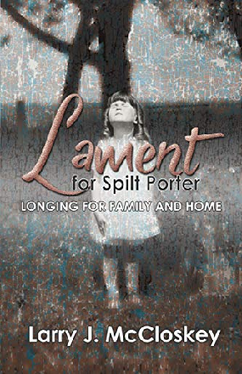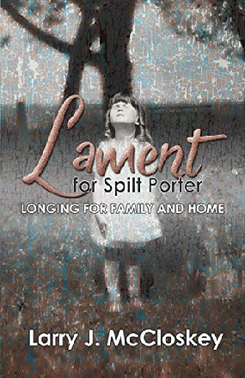 Today, please welcome author Larry McCloskey to Interviews & Reviews. Larry received two master's degrees from Carleton University before working as the Director of the Paul Menton Centre for Students with Disabilities for the past thirty years. He lives in Ottawa with his wife, three daughters, three grand-daughters, and two dogs. He is going to talk to us today about his latest book Lament for Spilt Porter and he's holding a giveaway so be sure to enter to win a copy! Larry, welcome to Interviews & Reviews!  Is there a story behind the title of your book? Yes, this book is based on, is an expansion of two articles that were published— a profile of my mom’s life and death published in the Ottawa Citizen, Christmas Eve, 2000, entitled ‘Enie’ which used the astonishing 1928 photo of a whimsical child of God, not so much posing as taking in the warm and wonder of the moment at a time when posing for a photo tended to be a utilitarian affair. That photo stayed with me and is the photo for the cover of the book. The other article published in the National Post 2007 entitled “Finding God at 30,000 Feet” caused Jonathan Kay to write to me to say that it motivated him to use it to start a series (7 or 9 day) on faith which he called: Faith Lost & found. Both of these articles are included in the book and are central to the story of my faith. Tell us about your book. The book is about trying to find faith in the nihilistic and materialistic world we live in — a world hostile to faith, religion, and the very existence of God. I work in the university where we are seeing a mental health crisis, and absent from discussion of contributing factors for the worsening mental health, is the most obvious answer of them all: it is a crisis of meaning. Young people who do not have religious context are told that the world, this life, and all it has to offer is about self, that meaning does not exist outside of self, which is not only blatantly false but creates huge stress. Young people live the illusion of endless choice—after all if there are endless choices, what happens if one chooses one thing from infinity and it goes wrong? This deep ambiguity leaves many young people without drive or purpose. The juxtaposition of this scenario contrasts to my parents’ generation. My contention is that we, boomers, did not honour the generational bargain; that is, to cast off some of our parents’ world but to make sure to carry forward some of the important values of our parents. Our kids did not get our parents’ resiliency, allegiance to God, family, country—things we took for granted and then lost. By trying to be friends with their parenting project instead of simply parenting, including or especially doing the hard work, we short changed our kids. Why is it important to look to our past? I have always looked back, been nostalgic and felt guilty for doing so. But once I latched on to the concept of short changing our kids by not passing on the wisdom of our parents’ generation, I realized that my faith was rooted in nostalgia in many ways, and that really we are not supposed to forget the past while embracing the exponentially quickening progressive future. I love the concept of our lives having meaning for embracing whomever God places in our path. The book wrote itself, as the cliche goes, with this basic, but essential thought in mind. (Three of these stories have just been added to my website as Podcasts, with music and still photos, which I think really helps to answer your question at: larrymccloskeywriter.com). Is there a message you want your readers to grasp in Lament for Spilt Porter? Yes —My mom was admired by the many priests and nuns in her life as being an exemplary Catholic. She and I were closest of her seven kids, but it pained that none of her brood embraced Catholicism. I’ve always felt guilt for that, and well, in middle age I have to admit she was right about everything, so I do want readers to understand that they should always do what their mother’s tell then to do. (My mom thought I was the funniest person on earth and so would enjoy me saying that. Sad fact is, the statement also holds much truth). Bottom line: I want people to grasp that the pursuit of faith is lifelong, must be done if we are to exit the meaningless nihilism of modern life, and the pursuit of faith will not come like a bolt of lightening if it comes at all, but by increment, hard work, and the best glimpses will present themselves in the reflection of those whom God places in our path. Looking at someone we have looked at a thousand times, and actually seeing them, is a very good start. What inspired you to write this book? The book is a tribute to my parents generation, but most of all to my parents. Also with age, I feel an increasingly intense need to try (honestly, pathetically, persistently) to express the inarticulate speech of the heart. Are there important steps we need to take to find our way home? A great question, with a fittingly short answer: its all about relationship. One of the self-evident truths I feel strongly about (coming from someone who doubts, always) is that when all is said and done, in contravention of the world as experienced by many perhaps most, relationships—including relationship with God—is all we have, is all that will endure, is it. Do you have any other books in the works? Yes. I should mention that I have six young adult novels in print and I co-founded a small publishing house after being published with Dundurn Press because of the way books have evolved away from common values into favour of the month stories with heavy ideological overtones. Our books allow kids to be kids, underscoring good story, characters, and not adult causes. Our website: dog-earedbooks.com. Also I am working on a book about the incredible people with disabilities I have had the privilege of working with for the past 30 years as the Director of the Paul Menton Centre for Students with Disabilities at Carleton University. More on understanding and embracing the concept of whomever God places in our path, more on the life long struggle with faith. In Lament for Spilt Porter there is a chapter about my brother, an Olympic cyclist who now has a high level disability and is in a wheelchair. I think there is meaning in this experience, meaning in suffering, and the book struggles with these issues— and I do mean struggle since issue of pain, loss and suffering are, after all, the most fundamental reasons people use for abandoning or railing against faith. That's very interesting. In a perfect world, what would "home" look like to you? Home is relationship, time in perpetuity, and really if love is one and indivisible as I believe (most of the time) nothing is lost, love — cliche unresisted— conquers all. Thank you, Larry, for visiting with us today. And now dear readers, if you fill out the form below you can have a chance to win Lament for Spilt Porter. This contest is now over. Congratulations to the winner - Linda K.  During the past thirty years, Larry McCloskey has become an accomplished writer, while his day job/vocation has been working with students with disabilities. He wrote Lament for Spilt Porter with a sense of urgency born of the need to reconcile a haunting sense of loss with our muted desire to find our way home. The desire for home—how we fit into this life and anticipate the next—is our most basic spiritual impulse, fueling our hopes and fears, passions and pathologies. But sadly, for many of us, the hunger for home has been supplanted by the primacy of self, with predictable results. At a time and in a place of greatest affluence and freedom, with technological means to connect all of us at all times, many of us are unhappy, isolated and on the question of meaning, lost. In the modern world, the individual rules without rules, but the cohesiveness of family and the need for home remains. Finding our way home and living the spiritually examined life has become more difficult in this warp speed modern distracted world. So maybe the only way forward Is to look back, rediscover the wisdom from the cast of characters that populate our past and informs our present, to find the miracle in the minutia, to go home. Your comment will be posted after it is approved.
Leave a Reply. |
�
Categories
All
Archives
July 2024
|



 RSS Feed
RSS Feed
2/19/2019
0 Comments